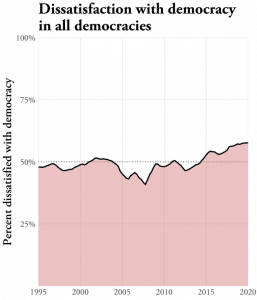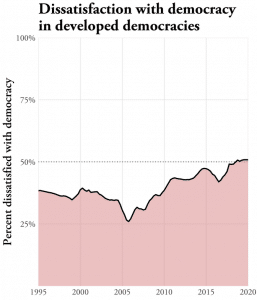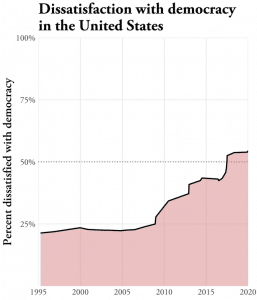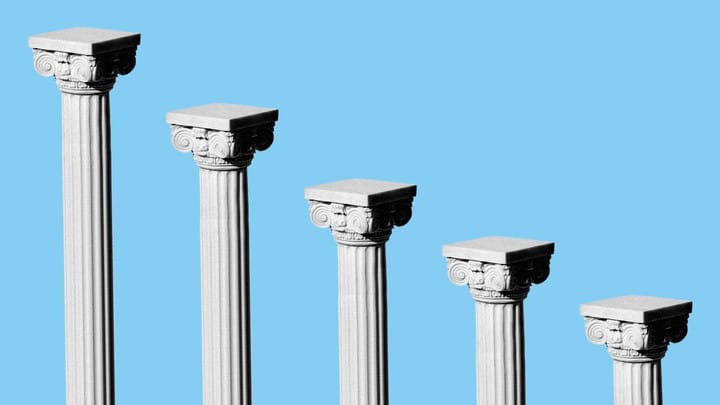March 2020 TGCI Blog Post #2 By Yascha Mounk and Roberto Stefan Foa
Note: This piece was originally published on The Atlantic and has been reproduced here with permission.
Citizens in stable democracies are supposed to be satisfied with the democratic process. Individual politicians or administrations may be unpopular. But if the public lacks commitment to democratic principles, or loses faith in democratic institutions, demagogues and opportunists may brush these aside.
That’s why we were concerned when, four years ago, we found that support for democracy in the United States, as well as many other countries around the world, was nearing dangerous lows. Some scholars saw evidence of a similar shift, while others disagreed. They maintained that the Western public remained reasonably content with democracy as a form of governance, and that there was little cause for panic.

A new report from the University of Cambridge’s Centre for the Future of Democracy, which one of us—Foa— co-authored, provides a broader look at this issue, and the conclusions are not hopeful, to say the least. The report analyzed data collected across 154 countries, 3,500 surveys covering more than 4 million respondents, and half a century of social-science research.
Satisfaction with democracy, according to the report, has eroded in most parts of the world, with an especially notable drop over the past decade. Public confidence in democracy is at the lowest point on record in the United States, the major democracies of Western Europe, sub-Saharan Africa, and Latin America. In some countries, including the United States, this metric is now reaching an important threshold: The number of people who are dissatisfied with democracy is greater than the number of people who are satisfied with it.
Three findings are particularly noteworthy. First, over the past quarter century, satisfaction with democracy has fallen across the democratic world as a whole. In the mid-1990s, citizens in a majority of countries for which there are data felt satisfied with the performance of their democracies. Except for a brief dip in the ’90s following the Asian and Latin American financial crises, this remained true until 2015, when a majority of citizens turned negative in their evaluation of democratic performance. Since then, dissatisfaction has continued to grow.
Overall, the report estimates that the number of individuals who are “dissatisfied” with the condition of democracy in their country has risen by 10 percentage points, from 48 percent to 58 percent. (This observation is based on a constant-country, population-weighted sample of 77 democracies for which relatively complete data exist from the mid-’90s to today. This represents 2.4 billion individuals across the span of Europe, Latin America, sub-Saharan Africa, the Middle East, North America, East Asia, and Australasia.)
The second noteworthy finding is that the fall in democratic satisfaction has been especially pronounced in those countries that were supposed to be especially stable: high-income, developed democracies. During the ’90s, about two out of every three citizens of democracies in Europe, North America, Northeast Asia, and Australasia felt satisfied with the way their country was run. Today, a majority is, for the first time, dissatisfied.

But dissatisfaction with democracy is not evenly distributed across countries of different sizes. While the citizens of many small democracies, such as Switzerland and Luxembourg, have become more satisfied with their political system, the world’s most populous democracies, including France, Japan, and the United Kingdom, have moved in the opposite direction.
Finally, the drop in satisfaction with democracy is both especially rapid and especially consequential in the United States. For much of its modern history, America has viewed itself as a model democracy that could serve as an example to countries that wished to emulate its success. Survey data show that there was a little substance to this hubris: as recently as 10 years ago, three out of every four Americans said that they were satisfied with the state of their democratic system.
During the 2008 financial crisis, this began to change. And since then, Americans have become more pessimistic about their system every single year. For the first time on record, polls show that a majority of Americans (55 percent) are dissatisfied with their system of government.
This marks a profound shift in America’s view of itself—and its place in the world.
When we first reported that citizens in supposedly consolidated democracies were growing dissatisfied with their political systems, our argument appeared out of sync with the times. Moderates such as David Cameron and Barack Obama governed in London and Washington, D.C.; the proto-populist Silvio Berlusconi had just been ejected from office in Italy; and Germany’s Angela Merkel enjoyed the largest parliamentary bloc her party had achieved in decades.

In the intervening years, Donald Trump became the president of the United States, Britain voted to leave the European Union, Matteo Salvini became Italy’s most popular politician, and Germany’s political culture has been transformed by the rise of a new far-right party.
So what seemed like a strange puzzle in 2015 now looks like a more straightforward story. Citizens have become steadily disenchanted with their democratic systems. As a result, they are more and more willing to vote for extremist politicians who promise to break with the status quo. It is perfectly possible that democracies will recover from their current crisis in the years to come. But every new data point makes it that much harder to deny that such a crisis exists.
We want to hear what you think about this article. Submit a letter to the editor or write to letters@theatlantic.com.

